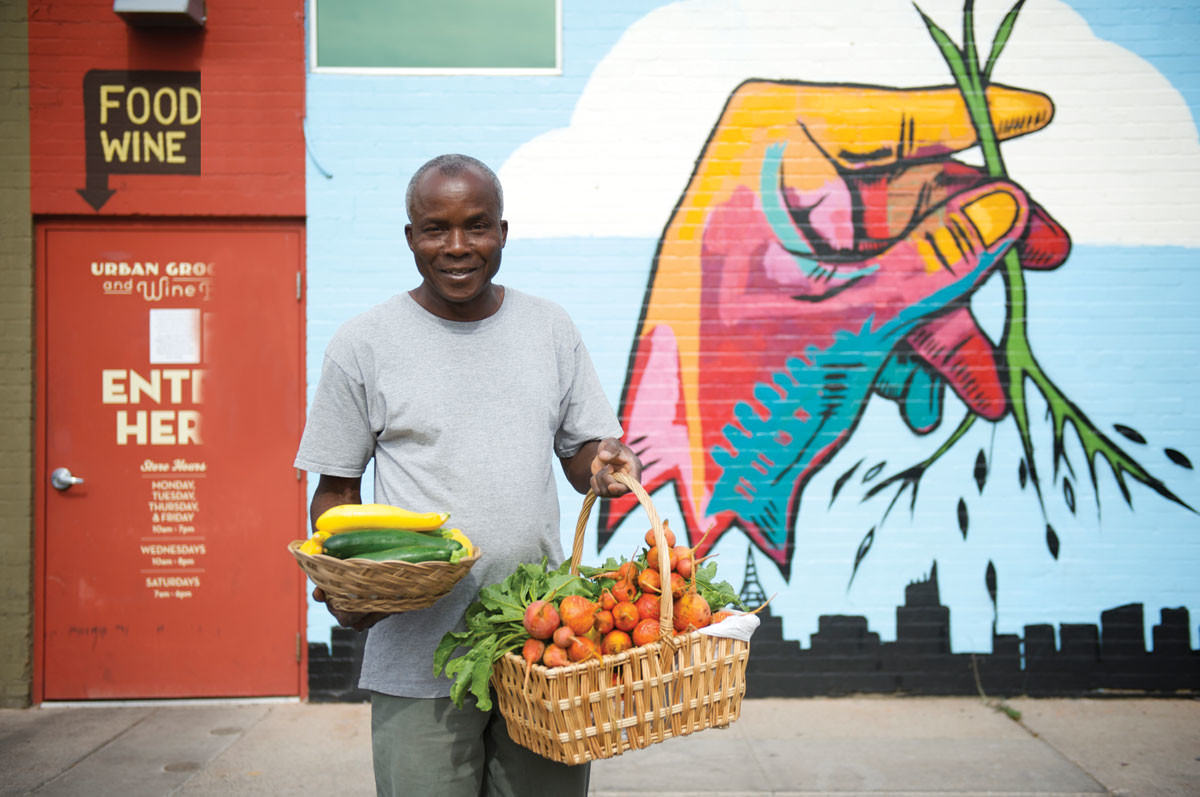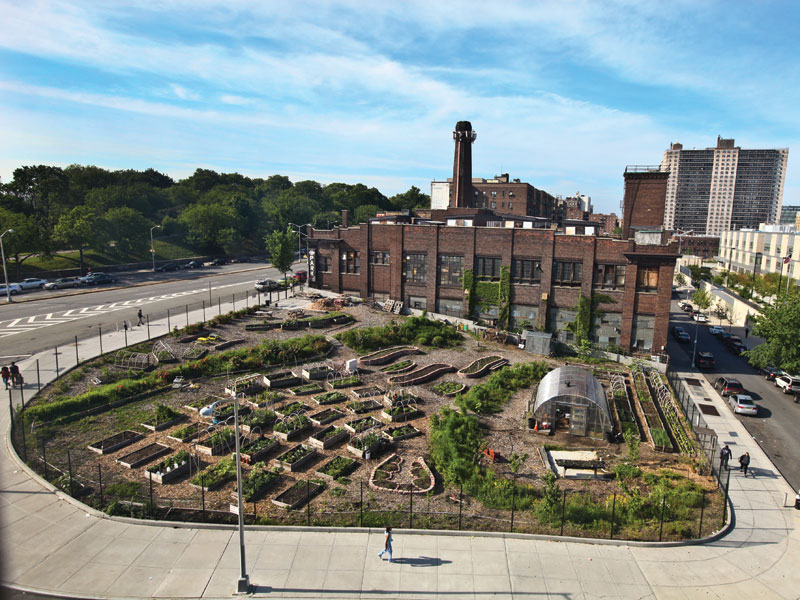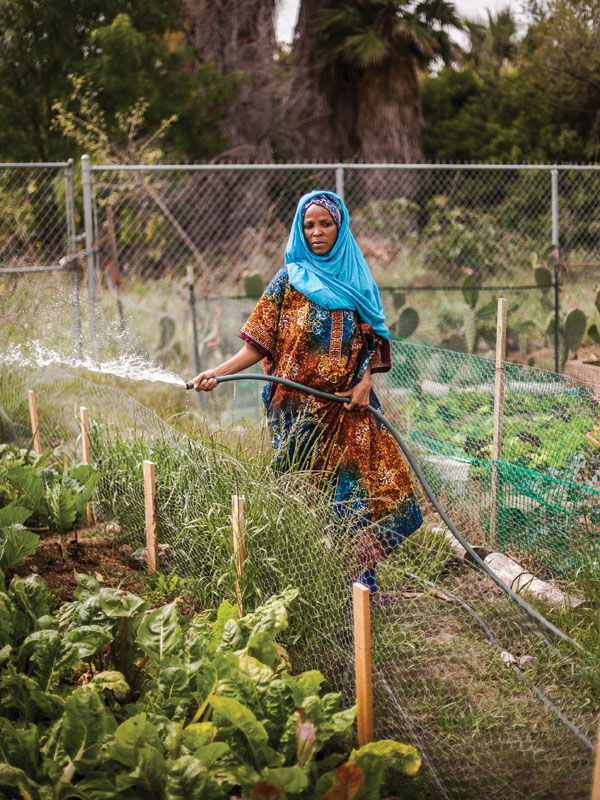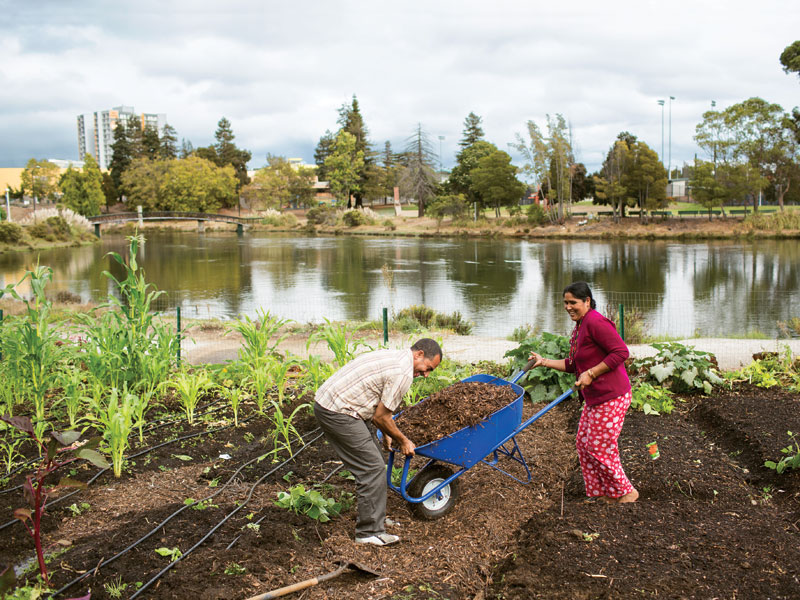International Rescue Committee Helps Refugees Plant New Roots
For refugees cut off from their agrarian pasts, an urban farming program does more than bring food to the table.
International Rescue Committee Helps Refugees Plant New Roots
For refugees cut off from their agrarian pasts, an urban farming program does more than bring food to the table.

Ogou fled to neighboring Ghana by foot, leaving behind everything he knew. (For two months, his family believed he’d been killed.) Both of Ogou’s parents farmed, and while serving in the army, he had lovingly tended the 76-acre cornfield responsible for feeding his fellow fighters. Ogou eventually built a happy life growing peanuts, yams, and peppers in his adopted Ghanaian village, but when a shift in that nation’s leadership rendered him vulnerable once again, he slipped off to a cousin’s place in the bustling capital city of Ivory Coast. Planting was out of the question. In 2008, the United States granted Ogou asylum, and he relocated to Chicago. “A very cold place,” he says, “where you cannot farm.” After two long winters, Ogou heard about a program in Phoenix, Arizona, run by the International Rescue Committee (IRC) that enables refugees to grow food. He immediately climbed on a plane.
Founded in 1933, the IRC permanently resettles people displaced by persecution, conflict, and disaster. The nonprofit organization’s agricultural program, New Roots, got its start in 2005, after a group of women who had escaped Somalia’s civil war expressed a fierce desire to farm in their new home of San Diego. IRC staff helped the women transform a 2.3-acre vacant lot into a vegetable garden, and by the end of the first summer, refugees from around the world were harvesting 1,000 pounds of produce each week. Today, those original Somali women, known as the Bahati (“Lucky”) Mamas, are able to support themselves by selling fruits and vegetables to area restaurants and at farmers markets.


The New Roots program has since expanded to 12 other cities, including Oakland, Baltimore, and Salt Lake City. In each, the IRC works with the local government to access a parcel of land (whether through leases or other arrangements), then makes it available to refugees and other individuals and community groups for a modest fee. Gardening alongside locals enables the newcomers to better integrate into their neighborhoods. The IRC also offers farmers market tours, cooking classes, and agricultural workshops as a part of the program.
In the South Bronx, kids from nearby high schools tend garden beds next to recent arrivals from Myanmar, Iraq, and Afghanistan.
On a half-acre expanse of green tucked improbably alongside a busy thoroughfare in the South Bronx, kids from nearby high schools tend garden beds next to recent arrivals from Myanmar, Iraq, and Afghanistan. Beneath a picturesque slope of Queen Anne’s lace, bee balm, and mountain mint planted to attract pollinators, Jamaicans harvest callaloo, and Cambodians, who settled in New York during the 1980s, cultivate bitter melons. Taking a break from shoveling compost, a Trinidadian woman talks proudly of the arugula, spinach, and peppers that she feeds her family. In this borough, where health indicators rank among the worst in the nation, the nutritional benefits of the program take on a particular resonance, says Kathleen McTigue, who oversees the Bronx farm for the IRC.
Waleed Al Shok, a 39-year-old Iraqi who came to New York City from Baghdad in 2013, is thankful for the mental dividends of New Roots. He’ll often bring his wife and young sons to the farm to relax amid his eggplant, beans, and garlic. None of it quite measures up to the taste of dates picked from his grandfather’s yard back home, Al Shok concedes, but there’s a sense of peace that comes simply from working the land. “Life in New York is not easy, especially if you have a family.”

Back in Phoenix, 63-year-old Koffi Ogou rarely misses a day tending the plot he rents from the IRC. After an initial fail (Ogou planted his entire quarter acre with okra, which Arizonans had no interest in eating), he now supplements his work as a caregiver at a group home by selling sweet potatoes, watermelon, turnips, and (a little) okra through a local CSA and to a network of customers built up over the years. Says Ogou, who doubts he’ll ever again touch the rich soil of his homeland, “This program is really good for those who come almost naked, who don’t have anything, not even hope.”
Follow us
This work is licensed under a Creative Commons Attribution-NoDerivatives 4.0 International License.
Want to republish a Modern Farmer story?
We are happy for Modern Farmer stories to be shared, and encourage you to republish our articles for your audience. When doing so, we ask that you follow these guidelines:
Please credit us and our writers
For the author byline, please use “Author Name, Modern Farmer.” At the top of our stories, if on the web, please include this text and link: “This story was originally published by Modern Farmer.”
Please make sure to include a link back to either our home page or the article URL.
At the bottom of the story, please include the following text:
“Modern Farmer is a nonprofit initiative dedicated to raising awareness and catalyzing action at the intersection of food, agriculture, and society. Read more at <link>Modern Farmer</link>.”
Use our widget
We’d like to be able to track our stories, so we ask that if you republish our content, you do so using our widget (located on the left hand side of the article). The HTML code has a built-in tracker that tells us the data and domain where the story was published, as well as view counts.
Check the image requirements
It’s your responsibility to confirm you're licensed to republish images in our articles. Some images, such as those from commercial providers, don't allow their images to be republished without permission or payment. Copyright terms are generally listed in the image caption and attribution. You are welcome to omit our images or substitute with your own. Charts and interactive graphics follow the same rules.
Don’t change too much. Or, ask us first.
Articles must be republished in their entirety. It’s okay to change references to time (“today” to “yesterday”) or location (“Iowa City, IA” to “here”). But please keep everything else the same.
If you feel strongly that a more material edit needs to be made, get in touch with us at [email protected]. We’re happy to discuss it with the original author, but we must have prior approval for changes before publication.
Special cases
Extracts. You may run the first few lines or paragraphs of the article and then say: “Read the full article at Modern Farmer” with a link back to the original article.
Quotes. You may quote authors provided you include a link back to the article URL.
Translations. These require writer approval. To inquire about translation of a Modern Farmer article, contact us at [email protected]
Signed consent / copyright release forms. These are not required, provided you are following these guidelines.
Print. Articles can be republished in print under these same rules, with the exception that you do not need to include the links.
Tag us
When sharing the story on social media, please tag us using the following: - Twitter (@ModFarm) - Facebook (@ModernFarmerMedia) - Instagram (@modfarm)
Use our content respectfully
Modern Farmer is a nonprofit and as such we share our content for free and in good faith in order to reach new audiences. Respectfully,
No selling ads against our stories. It’s okay to put our stories on pages with ads.
Don’t republish our material wholesale, or automatically; you need to select stories to be republished individually.
You have no rights to sell, license, syndicate, or otherwise represent yourself as the authorized owner of our material to any third parties. This means that you cannot actively publish or submit our work for syndication to third party platforms or apps like Apple News or Google News. We understand that publishers cannot fully control when certain third parties automatically summarize or crawl content from publishers’ own sites.
Keep in touch
We want to hear from you if you love Modern Farmer content, have a collaboration idea, or anything else to share. As a nonprofit outlet, we work in service of our community and are always open to comments, feedback, and ideas. Contact us at [email protected].by Jocelyn C. Zuckerman, Modern Farmer
October 28, 2015
Modern Farmer Weekly
Solutions Hub
Innovations, ideas and inspiration. Actionable solutions for a resilient food system.
ExploreExplore other topics
Share With Us
We want to hear from Modern Farmer readers who have thoughtful commentary, actionable solutions, or helpful ideas to share.
SubmitNecessary cookies are absolutely essential for the website to function properly. This category only includes cookies that ensures basic functionalities and security features of the website. These cookies do not store any personal information.
Any cookies that may not be particularly necessary for the website to function and are used specifically to collect user personal data via analytics, ads, other embedded contents are termed as non-necessary cookies.